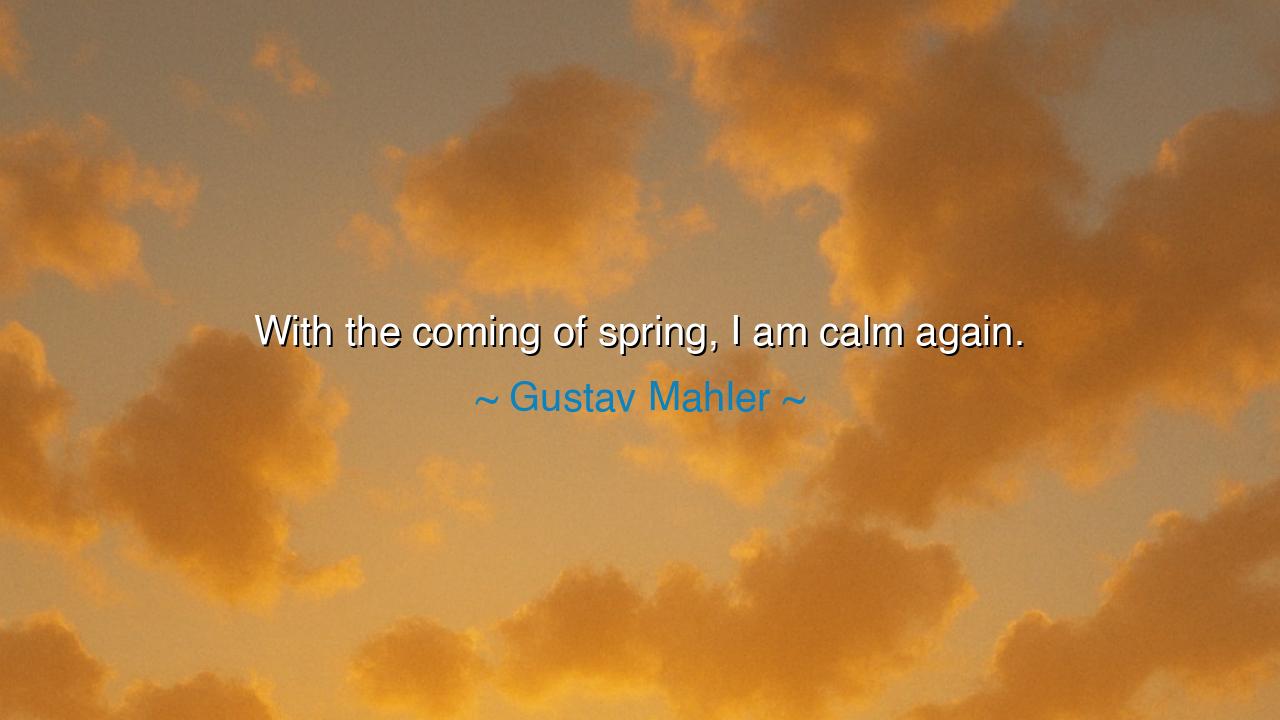
With the coming of spring, I am calm again.






Gustav Mahler once said: “With the coming of spring, I am calm again.” These words, though simple, flow with a depth of truth that reaches into the heart of every soul. For spring has always been more than a season; it is a symbol of rebirth, of the lifting of burdens, of the return of joy after the long sleep of winter. To Mahler, whose music often wrestled with shadows and storms, the arrival of spring was no mere change of weather, but a renewal of the spirit itself. Where winter froze the heart, spring melted it; where darkness brooded, light returned. And in that return, he found calm.
The origin of this saying is found in the life of Mahler, the great composer who lived through sorrow and turmoil. His works carry within them the weight of grief, struggle, and longing. Yet he was also a man deeply tied to nature, seeking its solace when the noise of the world overwhelmed him. For him, spring was a healer, a reminder that all suffering, however deep, eventually gives way to renewal. Just as the trees bud again after shedding their leaves, so too can the soul bloom after hardship. Thus, in his words, we hear not only personal comfort but a universal hymn to the resilience of life.
The ancients, too, revered spring as sacred. The Greeks celebrated Persephone’s return from the underworld, marking the rebirth of the earth. The Romans held festivals in honor of Flora, goddess of flowers, rejoicing in abundance. To them, spring was proof that even death bows before the eternal rhythm of renewal. Mahler’s voice joins this timeless chorus, for when he speaks of being calm again, he echoes the wisdom that peace comes not through force, but through surrender to life’s cycles.
Consider the story of Abraham Lincoln during the darkest days of the American Civil War. Weary with sorrow, burdened by loss, he often sought solace in quiet walks under the trees near the Potomac. It was said that as winter gave way to spring, the sight of blossoms returning gave him courage to endure. Though surrounded by death and division, he drew strength from the eternal truth written in the seasons: that even the coldest winter cannot last forever. His calm was not born of victory, but of hope renewed by the natural order.
Thus, Mahler’s words remind us that calm is not the absence of struggle, but the acceptance of life’s rhythm. Just as storms give way to clear skies, so too do seasons of sorrow yield to seasons of peace. We must learn, as he did, to wait for spring—both in the world and in ourselves. When despair surrounds us, we must remember that the earth itself whispers a promise: no winter is eternal. The thaw will come, the buds will return, and with them, our spirits will find rest.
The lesson for us is clear: seek renewal in the cycles of life. When overwhelmed, step into nature’s sanctuary. Let the sight of a flower opening, the sound of birds returning, or the warmth of the sun upon your face remind you that you, too, are part of this eternal renewal. Practice patience, for peace cannot always be forced, but it can be received when the season turns. Just as Mahler found calm not in conquest but in surrender to spring, so too can we.
In daily life, create your own seasons of renewal. Walk among trees when your mind is troubled. Breathe deeply when you feel bound by the cold of worry. Allow yourself to rest, to trust that storms will pass. Celebrate small signs of rebirth: a new opportunity, a moment of laughter, the healing of an old wound. These are your springs, and each brings calm if you choose to see it.
Therefore, remember Mahler’s wisdom: “With the coming of spring, I am calm again.” Let this be not only his song, but yours. Trust the cycles of life. Embrace the moments of stillness after struggle. And when you find yourself in winter, hold fast to the promise of spring—knowing that calm will return, as surely as the blossoms return to the branches, and as surely as dawn follows the night.






AAdministratorAdministrator
Welcome, honored guests. Please leave a comment, we will respond soon